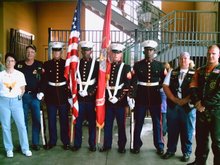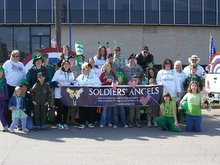
On Sundary, March 11, 2007, I crawled out of bed, groaning a bit in pain because of the long walk during the parade and after at the carnival. I rushed around to get down to the American Legion Post 370 to get to our "Operation Aces High" meeting. Soldiers' Angels in Kansas City are partnering with the American Legion Riders for a Poker Run on June 3, 2007 to raise money to support our wounded troops with First Response Back Packs. After the meeting, where the route, t-shirts and registration was discussed, a very interesting lady from the American Legion Auxillary joined the few remaining folks chit-chatting about our organization and the plans for the run.
I wish I had my video camera running so I could catch her entire commentary, but I will simply have to relay from memory the best I can.
When I first saw her, I realized that she was dressed as "Rosie the Riveter", but I didn't know why. She asked us about our organization and what we did. The American Legion Riders work closely with Soldiers' Angels in Kansas City, but it doesn't mean that all of the members of the American Legion know about Soldiers' Angels. When we explained about our organization, she said, "Oh, God bless you. It's wonderful what you are doing. I remember what happened to our boys in Vietnam. It was terrible, just terrible. It's up to you young people now. It's up to you to make sure it doesn't happen again."
One of our Angels agreed, "Not on my watch." We all agreed that we were not going to let that happen again, though most of us also laughed a bit about "you young people" since I believe we were all in our mid to late 30's standing around. But, it is all relative to the generations as to who are the "young people".
She went on to say that the American Legion Auxillary was not as active as it could have been until recently when they had an influx of "young people". She talked about going to schools and organizations talking to the young women about the history of the American Legion. An important point she made was that reading about it in a book could be dry and uninteresting. The way she got people interested was by going to these organizations and talking about it as a real person, basically bringing history alive.
She said she would start out by asking the young women, "How many of you have an eighteen to twenty year old brother or boyfriend?" Of course, many would raise their hands. "When my husband was eighteen he was sent to fight in Europe against the Nazis. A year later, he was nineteen and a prisoner of war." Then she would talk to them about what it was like to live in that era and the depravations that these soldiers lived through, both while fighting in the trenches and as prisoners of war. She would talk to them about service to our country and remembering the veterans who have defended their freedom.
This lady understood what it meant to be a country at war and how important it is to remember why we have these freedoms. If there is anything we should learn from women like her and our "greatest generation" is that the way forward is to remember our past and learn from it.  Rosie the Riveter represents a time of great social change, where people had to accept ideas outside of the norm: such as women working outside of the home in great numbers. More importantly, she represents the idea that people with a sense of community and common purpose can accomplish anything. She represents the idea that, in times of hardship, if we think outside the box, go outside of our comfort zone, we can make a difference. She represents the idea that every person in our community has something to offer towards the common goal.
Rosie the Riveter represents a time of great social change, where people had to accept ideas outside of the norm: such as women working outside of the home in great numbers. More importantly, she represents the idea that people with a sense of community and common purpose can accomplish anything. She represents the idea that, in times of hardship, if we think outside the box, go outside of our comfort zone, we can make a difference. She represents the idea that every person in our community has something to offer towards the common goal.
The Angel community is just such a community of "doers". From those that take on, create and manage big projects to deliver mounds of services, supplies and moral support, to those that work with their local communities or social groups to send out packages every month, to those who simply write a letter or two every week, everybody has a part to play in making our efforts to support our men and women a success.
Everyday, we have an opportunity to tell people about this common purpose, to share the idea of Soldiers' Angels: May no soldier go unloved. Some of us are great writers, prolific in letters and cards. Others are great organizers who can put together a donation drive or fund raiser. In many ways, Soldiers' Angels takes advantage of our natural inclination to be great shoppers, where we know where to get the best deals or how to talk people into giving discounts on bulk buying. And, there are those connections within our community, whether at church, social gatherings or in common places that allow us to motivate others to do great things for our men and women, serving our country and defending our freedom.
Whoever we are, wherever we are, whatever we do, we are the "Rosie the Riveters" of our generation. When Angels pull together, "We Can Do It!"
Cross referenced at the Castle - May no soldier go unloved
- May no soldier go unloved
To find out more about Soldiers' Angels and make a difference in the lives of our Soldiers, Sailors, Airmen and Marines, please go to Soldiers' Angels.

 American Legion Riders provide an escort for the arrival of the National Commander.
American Legion Riders provide an escort for the arrival of the National Commander.
Friday, March 16, 2007
Meeting Rosie the Riveter: WE CAN DO IT
Posted by Kat at 2:11 AM
Labels: American Legion, Home Front, KC Angels
Subscribe to:
Comment Feed (RSS)


 Soldiers' Angels: Adopt a Soldier
Soldiers' Angels: Adopt a Soldier











|